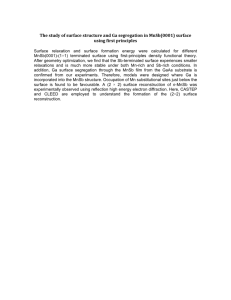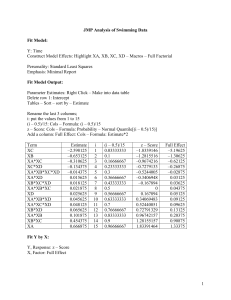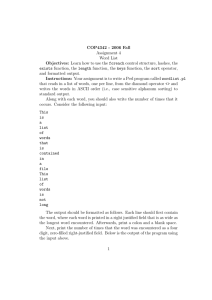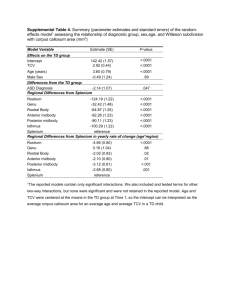Supporting Tables used in Wenchao Xu
advertisement
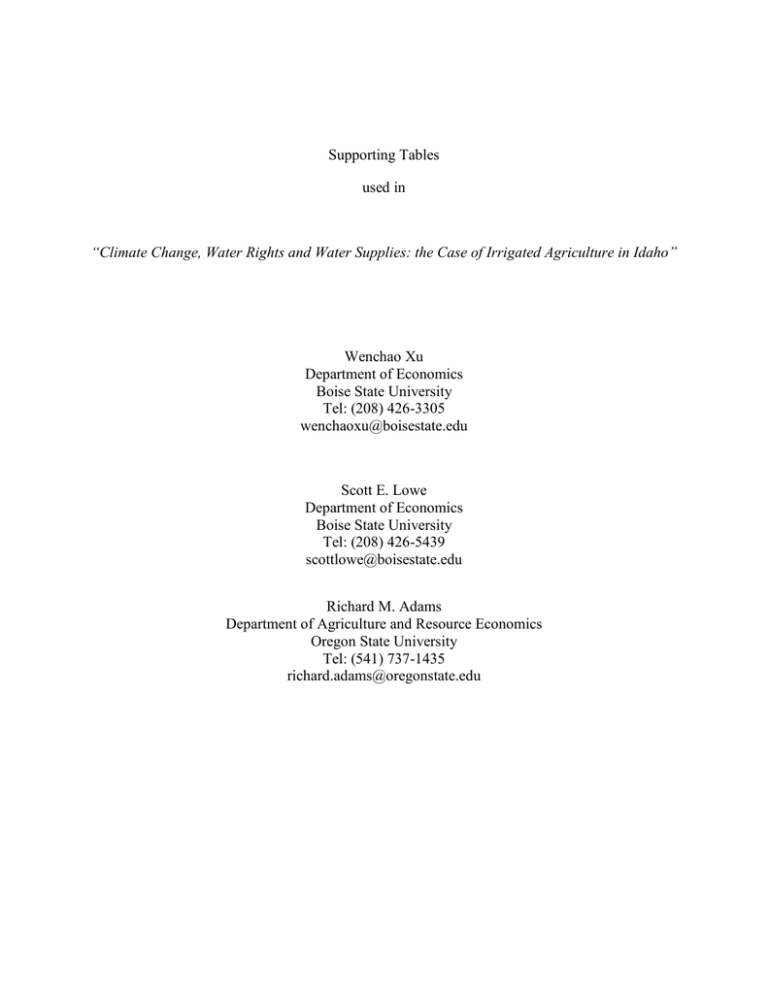
Supporting Tables used in “Climate Change, Water Rights and Water Supplies: the Case of Irrigated Agriculture in Idaho” Wenchao Xu Department of Economics Boise State University Tel: (208) 426-3305 wenchaoxu@boisestate.edu Scott E. Lowe Department of Economics Boise State University Tel: (208) 426-5439 scottlowe@boisestate.edu Richard M. Adams Department of Agriculture and Resource Economics Oregon State University Tel: (541) 737-1435 richard.adams@oregonstate.edu Table B.1 Abbreviations Used in this Article Abbreviation BEA BLA BLR BOI BRU BWR CAM CRB HEI HFB LLR LWR NPR OAK OWY PAY POR SAL SFC SPO SR1 SR2 SR3 SR4 SR5 WEI WIL CDL CBWTP GCM ICCDCD IDWR IPCC KAF KAs LSD MAF MAs NASS NRCS PRISM SWE USDA USDC USGS WSO Description Hydrological Basins/Sub-basins Bear River Basin, measured at the Bear River at the Stewart Dam Blackfoot River Basin, measured at the Snake River at Heise Big Lost River area, measured at the Big Lost River Below Mackay Reservoir Boise River basin, measured at Boise River near Boise Bruneau River Basin, measured at the Bruneau River near Hot Spring Big Wood River area, measured at the Big Wood River below Magic Reservoir Medicine Lodge-Camas Basin (Mud Lake) area, measured at the Snake River at Heise Clearwater River area, measured at the Clearwater River at Spalding Snake River near Heise and measure here Henry’s Fork River basin, measured at Henry’s Fork near Ashton Little Lost River area, measured at the Little Lost River near Howe Little Wood River area, measured at the Little Wood River near Carey Northern Panhandle Region, measured at the Moyie River at Eastport Oakley River area, measure at the Oakley Reservoir inflow Owyhee River area, measured at the Owyhee River below Owyhee Dam Payette River basin, measured at the Payette River near Horseshoe Bend Portneuf River Basin, measured at the Snake River at Heise Salmon River Basin, measured at Salmon River at Whitebird Salmon Falls Creek area, measured at the Salmon Falls Creek near San Jacinto, Nevada Spokane River area, measured at the Spokane River near Post Falls Heise-Idaho Falls area, measured at the Snake River at Heise Idaho Falls-American Falls area, measured at the Snake River at Heise American Falls-Boise area, measured at the Snake River at Heise Snake River from Boise to Weiser, ,measured at the Snake River at Heise Snake River in the canyon area, measured at the Snake River at Heise Weiser River basin, measured at the Weiser River near Weiser Willow River area, measured at the Snake River at Heise Others Cropland Data Layer Columbia Basin Water Transactions Program Global Circulation Model Irrigated Land Capability Classification - Dominant Condition Idaho Department of Water Resources Intergovernmental Panel on Climate Change Thousand Acre Feet Thousand Acres Land-Surface Datum Million Acre Feet Million Acres National Agricultural Statistics Service Natural Resources Conservation Service Parameter-Elevation Regressions on Independent Slopes Model Snow Water Equivalence U.S. Department of Agriculture U.S Department of Commerce U.S. Geological Survey Water Supply Outlook Table B.2 Pearson Correlation Coefficients Between Farm Level April Minimum Temperature and Long-term Water Supply Conditions (N=6509) April Precipitation Average April Precipitation - Average April Minimum Temperature - Average April Maximum Temperature - Average 1 April Minimum Temperature - Average -0.18379 (<.0001) 1 April Maximum Temperature - Average -0.42657 (<.0001) 0.92587 (<.0001) 1 April – September Total Available Water - Average -0.11422 (<.0001) 0.10156 (<.0001) 0.09400 (<.0001) Note: p-values in parentheses. April Adjusted Streamflow Average 1 Table B.3 Pearson Correlation Coefficients Between the Farm Level Measures of Minimum Temperatures from April to August (N=6509) April Minimum Temperature - Average May Minimum Temperature - Average June Minimum Temperature - Average July Minimum Temperature - Average April Minimum Temperature Average 1 May Minimum Temperature Average 0.991 (<.0001) 1 June Minimum Temperature Average 0.98041 (<.0001) 0.98991 (<.0001) 1 July Minimum Temperature Average 0.96456 (<.0001) 0.97305 (<.0001) 0.98677 (<.0001) 1 0.95273 (<.0001) 0.95566 (<.0001) 0.96497 (<.0001) 0.98975 (<.0001) August Minimum Temperature Average Note: p-values in parentheses. August Minimum Temperature - Average 1 Table B.4 Pearson Correlation Coefficients Between the Long-term and Annual Measures of Farm Level April Minimum Temperatures (N=6509) April Minimum Temperature - Average April Minimum Temperature Average April Minimum Temperature - 2011 April Minimum Temperature - 2011 April Minimum Temperature - 2010 April Minimum Temperature - 2009 April Minimum Temperature - 2008 1 0.89746 (<.0001) 1 0.92731 (<.0001) 0.94746 (<.0001) 1 0.9341 (<.0001) 0.94395 (<.0001) 0.96163 (<.0001) 1 April Minimum Temperature - 2008 0.94869 (<.0001) 0.89255 (<.0001) 0.95238 (<.0001) 0.94469 (<.0001) 1 April Minimum Temperature - 2007 0.94759 (<.0001) 0.92323 (<.0001) 0.95968 (<.0001) 0.95871 (<.0001) 0.96594 (<.0001) April Minimum Temperature - 2010 April Minimum Temperature - 2009 Note: p-values in parentheses. April Minimum Temperature - 2007 1 Table B.5 Average Crop-Revenue per Acre During the Crop Years from 2007 to 2011, by Priority Groups Priority group All crop years 2007 2008 2009 2010 2011 553.020 595.428 540.174 492.253 519.873 617.374 (276.807) (307.269) (129.272) (202.613) (194.477) (430.282) 515.156 562.827 515.134 478.495 513.674 505.650 (214.247) (232.098) (162.734) (231.472) (198.355) (229.470) Mean (1) Priority group (before 1870) (2) Priority group (1870-1890) (3) Priority group (1890-1910) 546.378 582.422 539.613 499.767 566.756 543.333 (319.586) (348.534) (261.586) (271.128) (406.906) (279.766) 602.455 653.748 588.011 565.422 583.214 621.879 (466.253) (507.316) (478.766) (403.950) (400.946) (522.979) 696.857 755.762 665.490 650.646 685.646 726.739 (495.579) (531.776) (479.910) (386.191) (454.746) (593.905) 696.776 742.794 676.172 684.506 677.457 702.949 (442.076) (463.579) (434.317) (435.083) (397.087) (473.252) 736.036 774.162 715.913 702.615 714.939 772.550 (571.742) (562.331) (611.498) (501.301) (522.539) (645.140) (1) vs. (2) <.0001 0.142 0.022 0.274 0.017 0.001 (2) vs. (3) <.0001 0.063 0.193 0.005 0.001 0.001 (3) vs. (4) <.0001 0.000 0.068 0.001 0.083 0.006 (4) vs. (5) <.0001 <.0001 <.0001 <.0001 <.0001 <.0001 (5) vs. (6) 0.066 0.407 0.722 0.057 0.244 0.610 (6) vs. (7) <.0001 0.057 0.007 0.055 0.365 0.023 (4) Priority group (1910-1930) (5) Priority group (1930-1950) (6) Priority group (1950-1970) (7) Priority group (after 1970) Kolmogorov-Smirnov Test ( p-value) Note: Standard deviation in parentheses. Table B.6 Empirical Regression Results of the Effects of Water Supply Information in Average Crop Revenue per Acre (Cont.) Model: OLS 2SLS (IV) Censored (Tobit) (1) (2) (3) Crops -134.424 *** -130.111 *** -166.407 *** Alfalfa (8.992) (8.962) (5.298) -53.406 *** -48.500 *** -54.162 *** Barley (5.825) (5.772) (4.417) 8.818 12.503 * -2.623 Bean (6.801) (6.798) (5.575) 18.334 *** 24.663 *** 14.215 *** Corn (5.793) (5.721) (4.608) -68.279 *** -60.414 *** -104.282 *** Hay (5.233) (5.096) (3.877) -120.982 *** -119.606 *** -129.284 *** Lentil (26.251) (26.353) (18.747) -52.434 *** -45.034 *** -49.172 *** Oat (5.678) (5.573) (4.775) 380.023 *** 384.344 *** 440.451 *** Onion (9.442) (9.506) (8.114) -39.920 *** -33.346 *** -42.011 *** Pea (7.077) (7.040) (6.182) 185.497 *** 192.342 *** 209.987 *** Potato (5.465) (5.360) (4.610) -8.355 -3.381 -50.775 *** Wheat (6.341) (6.264) (4.379) Basins & sub-basins 95.109 *** 98.661 *** 88.232 *** SR1 (10.716) (10.750) (8.000) 31.078 *** 33.695 *** 40.063 *** SR2 (11.932) (11.952) (8.062) -22.986 * -15.734 9.093 SR3 (12.544) (12.497) (8.942) 18.126 19.338 7.428 BOI (12.050) (12.074) (8.080) 21.701 25.213 44.987 ** BLA (27.012) (27.274) (19.058) 18.752 19.682 33.665 *** CAM (16.324) (16.344) (12.930) 165.371 ** 155.911 ** 94.078 *** SAL (65.891) (65.864) (34.399) Farm size -0.006 * (0.004) Farm size dummy 16.652 ** 5.979 50 to 99 acre (8.038) (5.433) 23.969 *** 12.275 ** 100 to 499 acre (7.239) (4.880) 50.074 *** 40.462 *** 500 to 999 acre (10.234) (7.749) 70.350 *** 69.088 *** 1000 to 999 acre (12.739) (10.327) 55.774 *** 50.563 *** >= 2000 acre (13.838) (11.246) 60.492 *** 60.143 *** 77.471 *** Growing Season (2007) (5.890) (5.904) (4.606) 23.337 *** 22.577 *** 12.088 ** Distance to Urbanized Areas (6.593) (6.595) (4.712) -2.247 *** -2.101 *** -0.677 ** Distance to Major Waters (0.444) (0.444) (0.316) -21.083 ** -20.163 ** -20.433 *** Soil quality - Dominant type (8.883) (8.897) (6.376) Soil quality - Dominant type squared 2.310 ** 2.277 ** 2.611 *** adjustment term (1.001) (1.002) (0.701) # Observations: 32,545 32,545 78,835 Adj R-square 0.186 0.185 Note: Robust standard errors in parentheses *** Significant at 1% level; ** Significant at 5% level; * Significant at 10% level. Table B.7 Sensitivity Analysis Results (OLS) (Cont.) Models (4) (5) Crops -131.499 *** -134.314 *** Alfalfa (8.986) (8.995) -52.439 *** -52.570 *** Barley (5.801) (5.812) 8.214 7.765 Bean (6.788) (6.790) -41.003 *** 18.854 *** Corn (7.069) (5.792) -69.339 *** -68.026 *** Hay (5.227) (5.238) 19.788 *** -136.294 *** Lentil (5.781) (25.563) -138.877 *** -52.563 *** Oat (25.100) (5.678) -51.841 *** 381.619 *** Onion (5.674) (9.438) 380.448 *** -40.409 *** Pea (9.424) (7.079) 184.915 *** 187.021 *** Potato (5.448) (5.429) -9.857 -8.292 Wheat (6.344) (6.343) Basins & sub-basins 85.386 *** 91.400 *** SR1 (9.225) (10.643) -17.704 19.540 * SR2 (11.975) (11.106) -39.323 *** -21.802 * SR3 (12.215) (12.540) 4.858 11.010 BOI (11.064) (11.583) 13.072 16.995 BLA (26.381) (26.959) 8.818 11.771 CAM (15.025) (16.155) -48.457 *** 165.768 ** SAL (18.555) (65.895) Farm size 17.030 ** 16.296 ** 50 to 99 acre (8.030) (8.039) 24.966 *** 22.893 *** 100 to 499 acre (7.215) (7.243) 51.647 *** 49.431 *** 500 to 999 acre (10.218) (10.261) 72.484 *** 70.628 *** 1000 to 999 acre (12.730) (12.797) 56.279 *** 56.527 *** >= 2000 acre (13.817) (13.860) 60.619 *** 61.793 *** Growing Season (2007) (5.887) (5.848) Distance to Urbanized 55.489 *** 31.017 *** Areas (7.289) (5.837) -2.482 *** -2.359 *** Distance to Major Waters (0.440) (0.443) -25.064 *** -22.624 ** Soil quality - Dominant type (8.841) (8.862) 2.780 *** 2.486 ** Soil quality squared adjustment term (0.998) (0.999) (6) (7) (8) -135.720 *** (8.989) -53.276 *** (5.819) 9.331 (6.801) 18.382 *** (5.793) -69.745 *** (5.222) -122.121 *** (26.251) -53.765 *** (5.671) 380.064 *** (9.437) -39.688 *** (7.077) 185.919 *** (5.465) -8.633 (6.340) -149.358 *** (10.678) -61.885 *** (6.916) 12.223 (8.075) 27.851 *** (6.879) -81.749 *** (6.214) -139.021 *** (31.171) -61.787 *** (6.743) 407.881 *** (11.212) -48.604 *** (8.404) 208.080 *** (6.489) -9.668 (7.529) -125.911 *** (8.897) -53.653 *** (5.747) 6.114 (6.725) 20.768 *** (5.725) -69.382 *** (5.189) -119.295 *** (25.923) -52.523 *** (5.627) 381.288 *** (9.273) -37.318 *** (7.049) 185.414 *** (5.377) -7.732 (6.249) 96.552 *** (10.707) 30.319 ** (11.951) -21.308 * (12.552) 16.534 (12.078) 21.855 (26.999) 21.760 (16.298) 151.432 ** (65.560) 114.139 *** (12.725) 39.336 *** (14.168) -11.871 (14.896) 11.949 (14.309) 25.787 (32.075) 24.798 (19.384) 172.470 ** (78.242) 90.561 *** (10.622) 28.824 ** (11.809) -26.881 ** (12.333) 15.133 (11.909) 25.582 (26.109) 10.413 (16.254) 174.736 *** (64.544) 16.302 ** (8.039) 22.837 *** (7.230) 47.557 *** (10.218) 67.641 *** (12.723) 52.460 *** (13.818) 53.918 *** (5.611) 23.199 *** (6.603) -2.223 *** (0.444) -20.175 ** (8.880) 2.194 ** 21.023 ** (9.545) 30.980 *** (8.596) 61.251 *** (12.152) 87.429 *** (15.127) 74.441 *** (16.432) -58.712 *** (6.994) 24.508 *** (7.829) -2.580 *** (0.527) -8.938 (10.548) 0.852 13.232 * (7.899) 18.435 *** (7.077) 42.828 *** (10.095) 60.398 *** (12.623) 37.199 *** (13.719) 62.479 *** (5.820) 20.461 *** (6.473) -2.187 *** (0.441) -24.433 *** (8.770) 2.700 *** (1.000) # Observations: 32,545 32,545 32,545 Adj R-square 0.187 0.186 0.186 Note: Robust standard errors in parentheses *** Significant at 1% level; ** Significant at 5% level; * Significant at 10% level (1.188) (0.990) 32,545 0.173 32,545 0.183 Table B.8 Projected Losses In Crop Revenues Along the Snake River: Average Crop Revenue per Acre Temperature Surface water supply Mean Volatility Crop revenue Mean Volatility Gain/Loss + 1 °C - 0.5 °C - 19.8% + 5% -0.56 - 0.5 °C - 29.6% + 5% -24.66 + 1.0 °C - 29.6% + 5% -195.51 + 1.0 °C -44.2% + 5% -231.40 - 0.5 °C - 19.8% + 5% 3.24 - 0.5 °C - 29.6% + 5% -20.86 + 1.0 °C - 29.6% + 5% -191.71 + 1.0 °C -44.2% + 5% -227.60 - 0.5 °C - 19.8% + 5% 7.04 Using estimates from model (1) + 2 °C + 3 °C - 0.5 °C - 29.6% + 5% -17.06 + 1.0 °C - 29.6% + 5% -187.91 + 1.0 °C -44.2% + 5% -223.80 Using estimates from model (3) + 1 °C + 2 °C + 3 °C - 0.5 °C - 19.8% + 5% 36.58 - 0.5 °C - 29.6% + 5% 28.36 + 1.0 °C - 29.6% + 5% -145.64 + 1.0 °C -44.2% + 5% -157.87 - 0.5 °C - 19.8% + 5% 36.98 - 0.5 °C - 29.6% + 5% 28.76 + 1.0 °C - 29.6% + 5% -145.24 + 1.0 °C -44.2% + 5% -157.47 - 0.5 °C - 19.8% + 5% 37.38 - 0.5 °C - 29.6% + 5% 29.16 + 1.0 °C - 29.6% + 5% -144.84 + 1.0 °C -44.2% + 5% -157.07 Note: We assume that carbon emissions, land uses, crop prices, water governance structures, and ground water levels are held constant, and the standard deviations of the temperature and water supply under actual 2002-2010 realizations. We also assume that the pattern of the standard deviation of water supply is based on observations from the past 100 years. Table B.9 Long-Term Changes in the Depth to Ground Water at Irrigation Wells Across Idaho: Water Level Below Land-Surface Datum (LSD) (Unit: Feet) Well groups Total # of wells 1 5-year average water level Percentage Beginning level Ending level % Change By the ending level groups All Groups (1) Depth to water (<= 0) 865 36 100% 4.20% 169.95 -50.40 182.84 -35.80 7.60% 29.00% (2) Depth to water (0 ~ 25) 158 18.30% 10.70 12.30 15.00% (3) Depth to water (25 ~ 50) 87 10.10% 33.34 37.46 12.40% (4) Depth to water (50 ~ 100) 138 16.00% 65.36 71.38 9.20% (5) Depth to water (100 ~ 200) 134 15.50% 133.93 147.90 10.40% (6) Depth to water (200 ~ 300) 111 12.80% 226.28 246.70 9.00% (7) Depth to water (> 300) 201 23.20% 458.42 483.55 5.50% By the nature and magnitude of change Increase in water depth (1) Depth to water increase (0~1%) 29 3.40% 379.98 382.14 0.60% (2) Depth to water increase (1~5%) 190 22.00% 346.46 355.72 2.70% (3) Depth to water increase (5~10%) (4) Depth to water increase (10~50%) 138 231 16.00% 26.70% 194.82 112.23 208.82 134.75 7.20% 20.10% (5) Depth to water increase (> 50%) 93 10.80% 32.12 67.05 108.70% (6) Depth to water decrease (0~1%) 12 1.40% 226.94 226.00 -0.40% (7) Depth to water decrease (1~5%) 39 4.50% 174.30 170.08 -2.40% (8) Depth to water decrease (5~10%) 22 2.50% 81.08 75.44 -7.00% (9) Depth to water decrease (10~50%) 82 9.50% 29.82 24.09 -19.20% (10) Depth to water decrease (> 50%) 29 3.40% 20.95 11.34 -45.90% (1) Observation period (20 ~ 30) 324 37.50% 144.54 153.86 6.40% (2) Observation period (30 ~ 40) 177 20.50% 145.16 159.28 9.70% (3) Observation period (40 ~ 50) (4) Observation period (50 ~ 60) 196 112 22.70% 12.90% 181.52 224.32 194.96 240.85 7.40% 7.40% Decrease in water depth By the range of the years for the observation of each well (5) Observation period (> 60) 56 6.50% 246.02 266.60 8.40% Note: The summary statistics are calculated by using irrigation wells with at least 20 years of observations. The beginning and ending levels of ground water depth are calculated as the average values of the first and the last five observations for these wells respectively. 1 We have summarized the ground water levels at the individual irrigation wells from three perspectives: (1) By the ending level of the depth to water; (2) by the nature and magnitude of the change from the beginning level to the ending level; and (3) by the range of the duration for the observation for each well. Note that, the increase in depth to ground water indicates the decrease in ground water level. Irrigation wells in this data sample possess at least 20 years of measurements, which, however, may not have been taken continuously. We find that, in general, irrigation wells with relatively shallow water levels tend to have more change in depth over time. Irrigation well water levels have declined over time.
